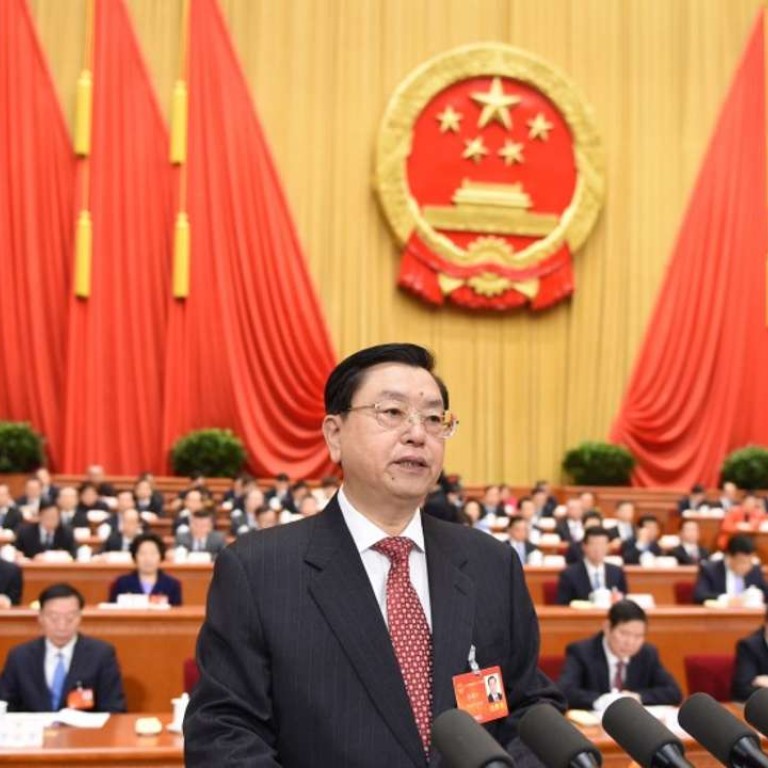
China’s hold on Hong Kong: who makes the policy decisions for the city?
A look at the people and agencies in mainland China who have a say in handling Hong Kong’s affairs, ahead of Zhang Dejiang’s visit to the city this week
Ahead of state leader Zhang Dejiang’s three-day visit to Hong Kong on Tuesday, a question that has popped up in the cocktail circuit: just who exactly in the central leadership decides on how to handle Hong Kong’s affairs? How influential is Zhang, who is the National People’s Congress chairman? While there may be no shortage of important leaders and intellectuals from official think tanks having a say, Hong Kong policy is decided at the apex – by President Xi Jinping himself. Make no mistake about that, say analysts. Even so, there is a formal hierarchy that has existed over time. Here is a look at the hierachy, over the years:

The leading group on Hong Kong and Macau Affairs was established that year in a move to ensure greater attention on Hong Kong affairs and better coordination of efforts by different agencies. Caught off guard by the July 1 march, Beijing decided it had to be more assertive. The group, which has always been led by the Communist Party’s Politburo Standing Committee members, studies the social situation of the two special administrative regions, and co-ordinates the work relating to Hong Kong and Macau among various central government departments, covering political, economic, ideology and national security.
Vice-President Zeng Qinghong became the first leader of the leading group on Hong Kong and Macau Affairs. Zeng was then the fifth-highest ranking member in the standing committee of the Communist Party’s Politburo, the nation’s top decision-making body. Zeng retired in 2007.
Then Vice-President Xi Jinping took over the helm, until he was promoted to the presidency in 2012.
Zhang Dejiang, National People’s Congress chairman succeeded Xi to head the leading group. His current deputies are Vice-President Li Yuanchao and State Councillor Yang Jiechi.
The leading group comprises heads of more than a dozen central government ministries and departments, such as the Hong Kong and Macau Affairs Office (HKMAO), the central government’s liaison offices in Hong Kong and Macau, Ministry of Public Security, Ministry of State Security, Ministry of Commerce and the People’s Bank of China.
The Hong Kong and Macau Affairs Office assists the leading group in handling Hong Kong affairs.
Wang Guangya, a career diplomat and former ambassador to the United Nations, was appointed as head of the office in 2010. In March 2016, Wang, 66, dropped a strong hint that he could be retiring “any time”, saying: “The state requires that [officials] retire by age 65. I’ve already reached that.”
The central government’s Hong Kong liaison office is its representative in the city. Before the handover it was called the Hong Kong branch of Xinhua News Agency, as Beijing refused to set up a consulate in what it considered its own territory. Its job, as its name suggests, is to act as liaison for the affairs of the central government in its decisions on Hong Kong. The liaison office is often referred to as “Sai Wan” or “Western District”, the Hong Kong island district where its headquarters is based.
Zhang Xiaoming is the current director, who spent 26 years in the HKMAO and rising through the ranks before his appointment in December 2012. In September last year, he sparked a row by declaring that Hong Kong’s chief executive had a special legal status that transcended the executive, the legislature and the judiciary
Tung Chee-hwa, the former chief executive of Hong Kong and who is now vice-chairman of the Chinese People’s Political Consultative Conference, is probably the most prominent among leaders within the city who help shape Beijing’s policy towards the city. He is seen as a figure with close connections with the top leadership. He was widely regarded as the one who persuaded Xi Jinping to endorse Leung Chun-ying to be the chief executive in 2012.


